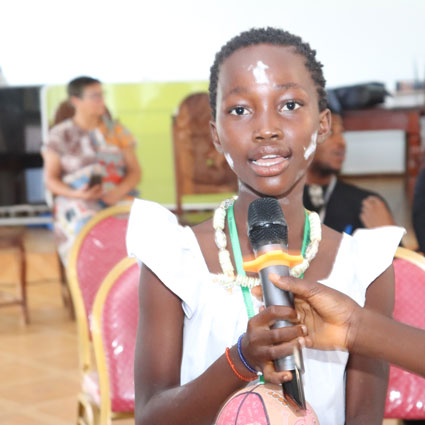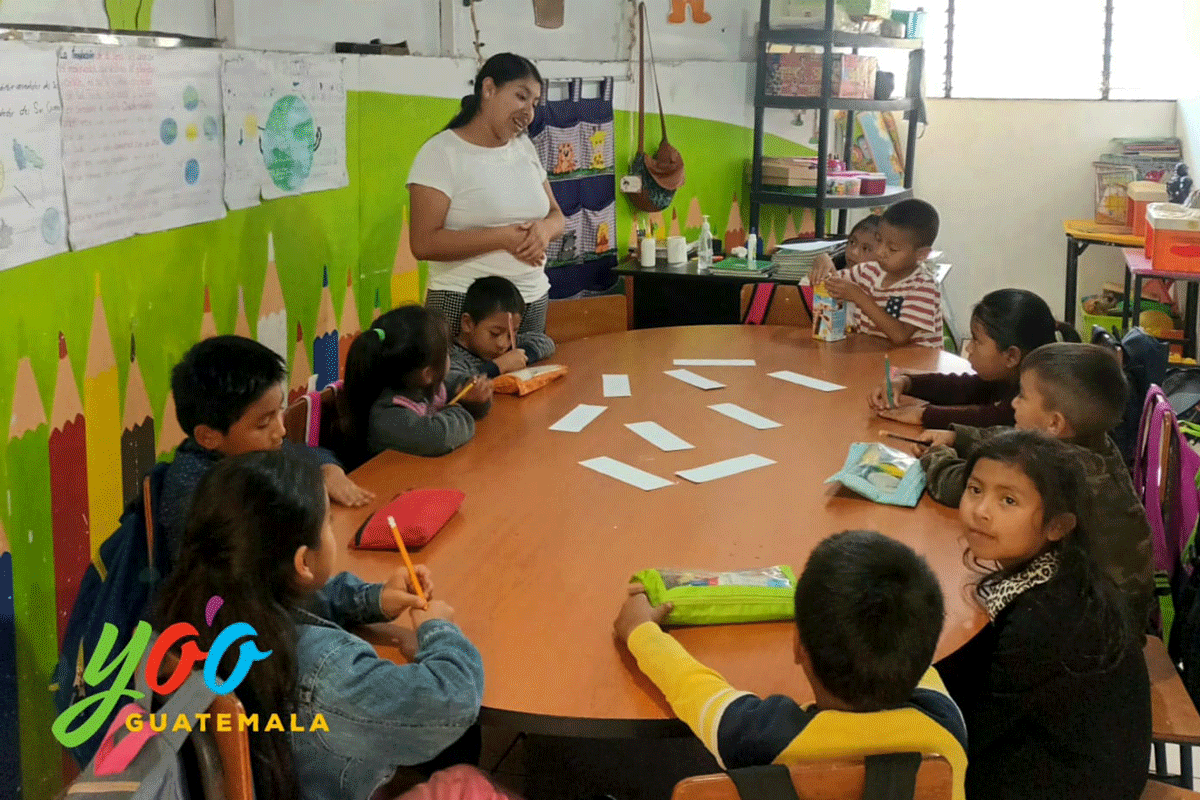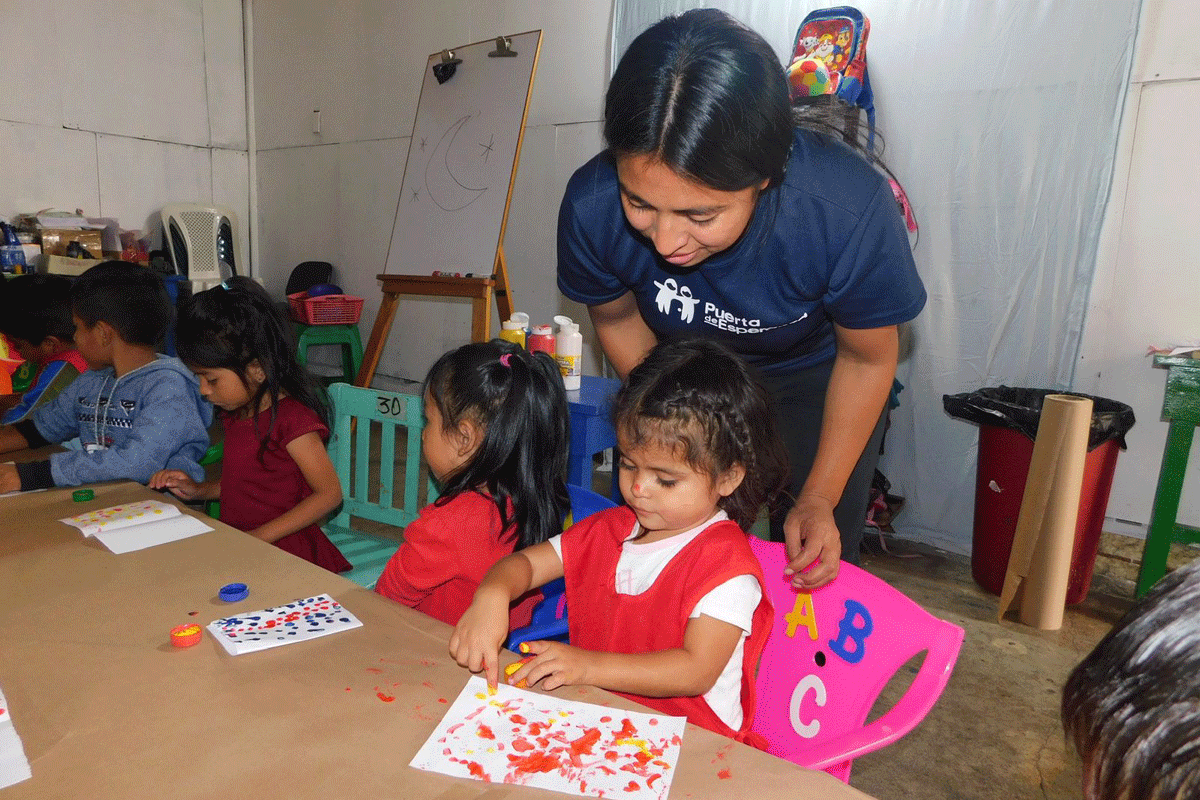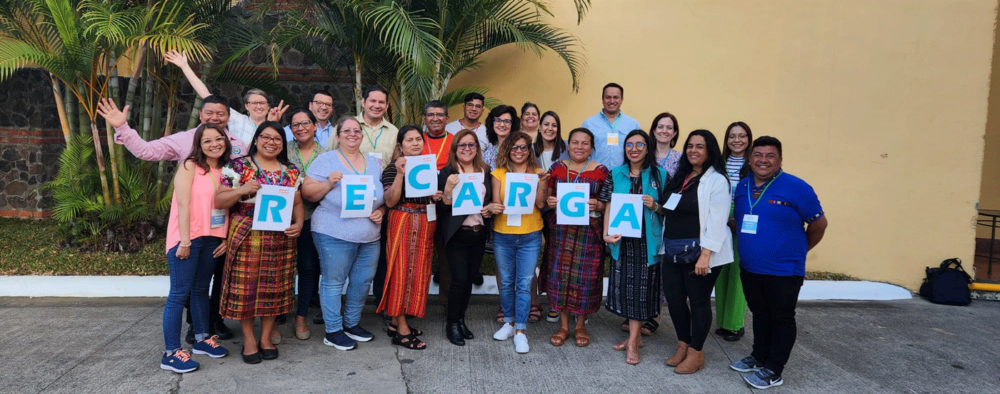
Educação
Educação
Nota do editor: esta postagem do blog também está disponível em espanhol.
RECARGA é uma abertura para compartilhar, interagir, retribuir e desaprender
atravessa fronteiras e planta oportunidades
é a empatia, a luz da esperança para as crianças
é a unidade ou soma da sabedoria
A RECARGA sonha com uma educação libertadora
Mensagem da Fundação Nueva Esperanza, ttraduzido e parafraseado do espanhol e do maia Achi
O Terminal Market na Cidade da Guatemala é o maior mercado da América Central. É um lugar vibrante, mas também frequentemente violento e onde é difícil escapar da pobreza. Quando as escolas abriram para o ano em fevereiro, o parceiro da RECARGA Porta da Esperança reabriu o único centro de aprendizagem infantil dentro do Terminal Market, um projeto que o governo havia abandonado durante a pandemia. Agora, as crianças pequenas têm um espaço seguro para atingir marcos críticos de desenvolvimento que abrirão um caminho pela educação em direção a um futuro além do mercado.
Nos arredores da Cidade da Guatemala, o parceiro da RECARGA EPRODEP usou sua bolsa REGARGA para não apenas salvar, mas também expandir sua sala de aula de educação especial para 26 alunos. O EPRODEP fornece o único programa de educação especial em sua comunidade periurbana de mais de 100.000 pessoas, um recurso crucial porque as escolas administradas pelo governo rejeitam alunos com deficiências de aprendizagem.

Em Honduras, o Centro Indígena de Capacitação Artesanal em Intibucá (CICAI), fundada há quase 50 anos pelo povo indígena Lenca, se transformou em uma escola secundária magnética totalmente credenciada com a ajuda de financiamento dos Ministérios da Cultura e da Educação. Então, devido à corrupção política, ela foi despojada de recursos ao longo de um período de dez anos e, finalmente, deixada em ruínas pela pandemia.
Felizmente, a história não terminou aí. No ano passado, o novo diretor da escola, um jovem ativista social indígena, começou a motivar a associação de pais e professores a continuar o legado de liderança comunitária da escola. Usando fundos de subsídios da RECARGA e dinheiro arrecadado localmente, a associação de pais e professores substituiu completamente o telhado da escola, renovou espaços de oficinas técnicas e reabriu o internato das meninas. A matrícula formal de graduação da escola expandiu em 34% e também pôde receber 22 alunos técnicos sem graduação. Vinte e nove alunos agora recebem bolsas de transporte para viajar diariamente de suas comunidades rurais para a escola, e seis meninas se mudaram para o internato.
“Graças à reabertura do CICAI e à iniciativa RECARGA, estamos motivadas a manter nossos compromissos para atingir nossas metas. Somos meninas Lencan que estamos tornando nossos sonhos realidade.” – Estudantes do CICAI em Intibucá, Honduras
A RECARGA ajuda organizações individuais, mas mais do que isso, ela está tecendo redes que podem catalisar ações coletivas. Depois que os parceiros guatemaltecos se encontraram pessoalmente em março e abril, a GFC respondeu à sua ânsia organizando uma rodada de doações participativas. O grupo passou os dois meses seguintes fazendo brainstorming e discutindo propostas, antes de endossar $20.000 em pequenas doações. Essas doações facilitarão visitas de intercâmbio entre parceiros; um curso de certificação em liderança restaurativa; dois projetos de saúde mental e resolução de conflitos em escolas; enviar alunos dos programas de cada parceiro para o Festival Anual do Livro da Guatemala; e uma campanha de artes visuais focada em educação.
“[RECARGA] nos faz sentir que não estamos sozinhos. Às vezes, como um pequeno projeto, sentimos que estamos nadando contra a corrente e que estamos tentando fazer mudanças que talvez ninguém mais veja. Então, ver outras pessoas trabalhando como nós é realmente inspirador. Compartilhar nossas ideias, metodologias e propostas educacionais é realmente interessante e bonito.”– Hilda Vazquez, Diretora, Comunidad La Esperanza, Guatemala
Este primeiro ano da iniciativa RECARGA confirmou que leva tempo para construir um entendimento e uma visão compartilhados dentro de um grupo, mas a GFC acredita que quando as pessoas têm tempo e espaço para construir relacionamentos, as ideias, atividades e mudanças que vêm depois serão melhores, irão mais longe e durarão mais.

Além de fortalecer redes, a RECARGA faz a afirmação ousada de que apoiar a sociedade civil comunitária contribuirá para mudanças em maior escala no ecossistema educacional.
E muitas mudanças são necessárias para garantir que todas as crianças tenham acesso à educação que as incentive a se desenvolverem plenamente em toda a sua diversidade. Enquanto cada parceiro da RECARGA faz sua parte, a GFC também vê energia e oportunidades borbulhando para a advocacia coletiva, desde articular e representar artisticamente um manifesto de grupo para a mudança na educação até atividades conjuntas com a rede nacional de advocacia educacional Fórum Dakar Honduras. A GFC está animada para continuar alimentando essas energias e criatividade nos próximos anos com os parceiros da RECARGA.
Dê uma olhada no RECARGA Anuário 2022–2023 e entre em contato com Kimberly McClain, Codiretora Regional da GFC para as Américas, em kmcclain@globalfundforchildren.org se você quiser saber mais.
Foto do cabeçalho: Os parceiros do RECARGA se encontram e celebram juntos na Costa Rica a convite do Focus Central America, um dos doadores da colaboração de financiadores do RECARGA. © GFC
